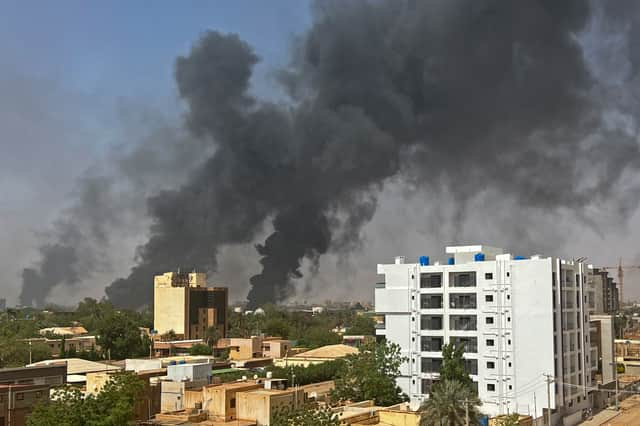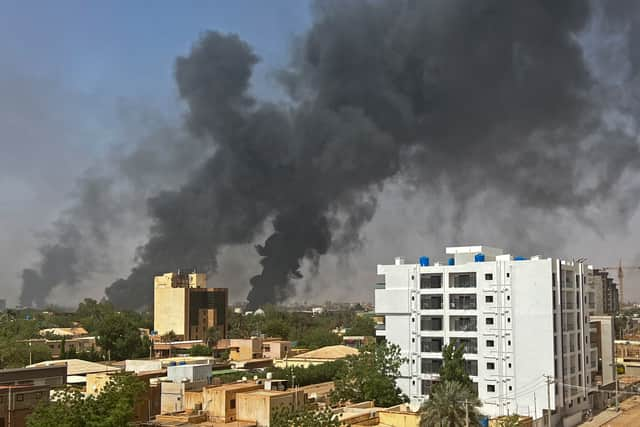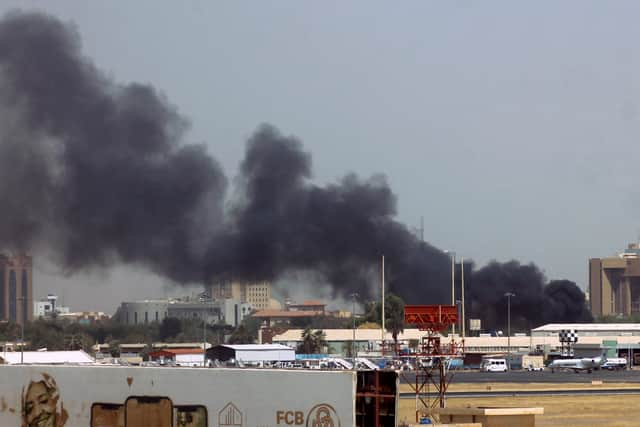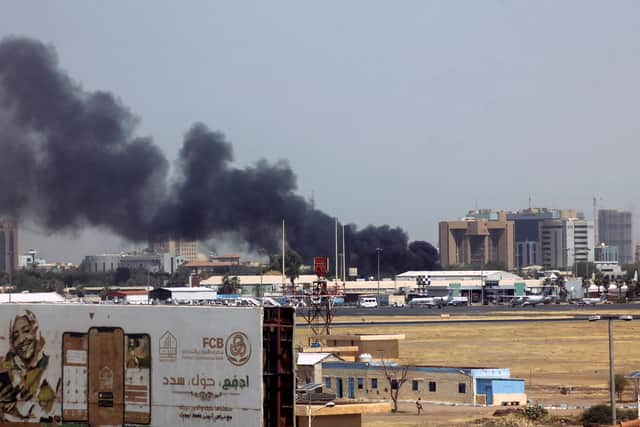Sudan: civilian death toll hits 97 as fighting intensifies, urgent warning issued for Brits


The Sudanese military and a powerful paramilitary group are battling for control of the chaos-stricken nation for a third day, signalling they are unwilling to end hostilities despite mounting diplomatic pressure to cease fire.
At least 97 civilians have now been killed, including three employees of the UN food agency. The Sudan Doctors’ Syndicate said it believed there were dozens of additional deaths among the rival forces. It said close to 600 people were wounded, including civilians and fighters. Brits currently in Sudan have been urged to stay inside.
Advertisement
Hide AdAdvertisement
Hide AdAs the conflict enters its third day, the Associated Press reports air strikes and shelling have intensified in parts of Khartoum, and the adjoining city of Omdurman. Rapid, sustained gunfire was heard near the military headquarters, with white smoke seen rising from the area. Residents reported power outages and incidents of looting.
The doctors’ group said a stray shell struck a hospital south of Khartoum on Monday morning, without causing casualties.
While there has been no official word on the number of fighters killed, footage posted online on Monday purported to show Rapid Support Forces (RSF) barracks in Omdurman, with the bodies of dozens of men in camouflage uniforms sprawled on beds and the floor of a medical ward and in a sandy outdoor area.
Another video showed civilians inside the base, apparently looting food. The authenticity of the videos could not be confirmed independently, but they surfaced after the military said it had targeted RSF bases with air strikes. Mohmed al-Mokhtar al-Nour, an RSF adviser, told Al Jazeera on Sunday that RSF forces have withdrawn from the camp.


Advertisement
Hide AdAdvertisement
Hide AdThe clashes capped months of heightened tensions between the military and its partner-turned-rival, the RSF. Those tensions had delayed a deal with political parties to get the country back to its short-lived transition to democracy, which was derailed by an October 2021 military coup.
Heavy fighting raged early on Sunday morning in the capital Khartoum and the adjoining city of Omdurman. There were fierce clashes around the military headquarters, Khartoum International Airport and state television headquarters, said Tahani Abass, a prominent rights advocate.
“The battles have not stopped,” she said from her family home close to the military headquarters. “They are shooting against each other in the streets. It’s an all-out war in residential areas.”
The Sudanese army said the fighting broke out after RSF troops tried to attack its forces in the southern part of the capital and accused the group of trying to take control of strategic locations in Khartoum, including the palace. The military declared the RSF a “rebel force” and branded the paramilitary’s statements “lies”.
Advertisement
Hide AdAdvertisement
Hide AdOne official, who spoke anonymously, said fighter jets took off from a military base north of Omdurman and attacked the RSF’s positions in and around Khartoum.
“No-one was able to sleep”
Ms Abass said her family spent the night huddling on the ground floor of their home. “No-one was able to sleep and the kids were crying and screaming with every explosion,” she said.
Sounds of gunfire were heard while she was speaking to The Associated Press. Military jets also pounded RSF bases across the capital.
Fighting was also reported in the western Darfur region, where tens of thousands of people live in camps for displaced people after years of genocidal civil war. The military and the RSF both claimed to be in control of strategic locations in Khartoum and elsewhere in the country.
Their claims could not be independently verified.
Advertisement
Hide AdAdvertisement
Hide AdBoth sides signalled late on Saturday that they were unwilling to negotiate. The military, headed by General Abdel-Fattah Burhan, called for dismantling the RSF, which it labelled a “rebellious militia”.
Clashes come amid rising tensions


The clashes come after escalating tensions between the military and the RSF in recent months, forcing a delay in the signing of an internationally backed deal with political parties to revive the country’s democratic transition.
Commercial planes trying to land in Khartoum began turning around to head back to their originating airport. Flights from Saudi Arabia turned back after nearly landing at Khartoum International Airport, flight tracking data showed.
Footage posted to Twitter purported to show RSF troops at the airport. Tensions between the army and RSF stem from a disagreement over how the latter should be integrated into the military and which authority should oversee the process.
Advertisement
Hide AdAdvertisement
Hide AdThe merger is a key condition of Sudan’s unsigned transition agreement.
However, the army-RSF rivalry dates back to the rule of autocratic president Omar al-Bashir, who was ousted in 2019. Under the former president, the RSF, led by powerful General Mohammed Hamdan Dagalo, grew out of former militias, known as the Janjaweed, which carried out a brutal crackdown in Sudan’s Darfur region during the decades of conflict there.


What has been said?
In a rare televised speech on Thursday, a top army general warned of potential clashes with the RSF, accusing it of deploying forces in Khartoum and other areas of Sudan without the army’s consent. The RSF had earlier defended the presence of its forces.
The paramilitary recently deployed troops near the northern Sudanese town of Merowe. Videos circulating on social media on Thursday showed what appeared to be RSF-armed vehicles being transported into Khartoum, further to the south.
Advertisement
Hide AdAdvertisement
Hide AdAccording to a statement from the Sudan Doctors Committee, which is part of the country’s pro-democracy movement, the clashes have led to “varying injuries”. The military said the fighting has resulted in a number of casualties but gave no further details.
The US ambassador to Sudan, John Godfrey, said he was “sheltering in place with the embassy team, as Sudanese throughout Khartoum and elsewhere are doing”.
“Escalation of tensions within the military component to direct fighting is extremely dangerous,” he wrote. “I urgently call on senior military leaders to stop the fighting.”
In Saturday’s statement, the RSF said it was contacted by three former rebel leaders who hold government positions in an apparent bid to de-escalate the conflict. In a joint statement, civilian signatories to December’s framework agreement also called for an immediate de-escalation.
Advertisement
Hide AdAdvertisement
Hide Ad“We call on the leadership of the Sudanese armed forces and the Rapid Support Forces to stop hostilities immediately,” it said.
Sudan has been marred in turmoil since October 2021, when a coup overthrew a western-back government, dashing Sudanese aspirations for democratic rule after three decades of autocracy and repression under Islamist ruler Mr Al-Bashir.
Comment Guidelines
National World encourages reader discussion on our stories. User feedback, insights and back-and-forth exchanges add a rich layer of context to reporting. Please review our Community Guidelines before commenting.